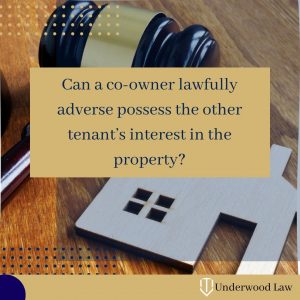While it is possible for a co-owner to lawfully adversely possess the other tenant’s interest in the property under California law, in practice, it is quite difficult and cumbersome.
 If you co-own or are a co-tenant of a shared piece of real estate property, possession is not enough for the court to determine that the other party will lose their rights or their interest in your shared real estate property.
If you co-own or are a co-tenant of a shared piece of real estate property, possession is not enough for the court to determine that the other party will lose their rights or their interest in your shared real estate property.
Read on to find out the elements that must be taken and proven in court to have a co-owner lawfully and successfully adversely possess the other tenants’ interest in the property.
 California Partition Law Blog
California Partition Law Blog

